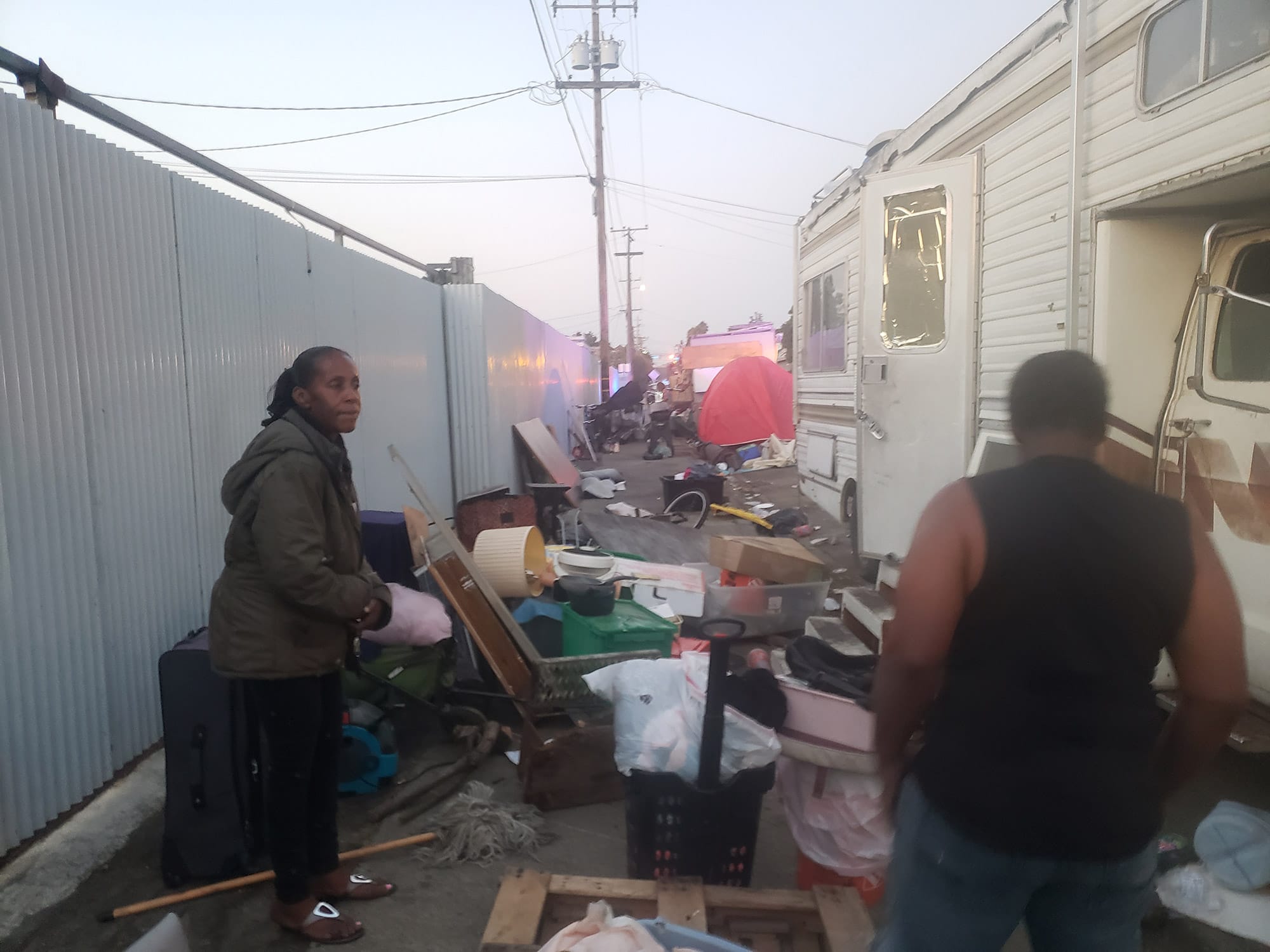VALLEJO – Vallejo police towed several vehicles used as shelter by homeless people Sunday night, one of the first enforcement actions targeting homelessness since a Supreme Court ruling gave West Coast cities expanded powers to ban people from sleeping outside.
The officers arrived on Lemon Street just before 8 p.m. Sunday and began knocking on the doors of RVs, trailers and vans telling residents to remove what they could carry with them before tow truck drivers hooked up the vehicular shelters to pull them off to a storage lot.
One officer mentioned an order by Gov. Gavin Newsom when telling residents that their vehicles would be towed and others used similar language from the order that recommended encampment removal based on public health and safety issues.
On Thursday, Newsom issued an executive order directing state agencies to remove encampments in response to a U.S. Supreme Court ruling last month in Grants Pass v. Johnson, which reversed a Ninth Circuit Court of Appeals decision which had prevented enforcement of camping bans unless shelter beds are available.
Newsom’s order is directed to state agencies but it explicitly encourages cities to take a similar route, although the jurisdictions are free to adopt or enforce their own policies.
Although the city no longer has to ensure there are enough shelter beds available in order to close down an encampment, Vallejo police have frequently towed vehicles for out of date registration of other violations. Sunday’s action is not a significant departure from the existing pattern of enforcement.
Newsom’s order calls on agencies and jurisdictions to contact service providers to request outreach services and to “use all available resources and infrastructure, including resources provided by the State’s historic investments in housing and intervention programs.”
However, residents whose vehicles were towed said that they had not received any support from service agencies, such as Caminar, a nonprofit that provides behavioral healthcare services in Northern California.
“I have been on Caminar’s list since before Caminar was Caminar and I have not gotten housing,” said 60-year-old Angela Hicklen, who found herself sitting on the street with all the belongings that she could pull out of her RV before police towed it.

Some residents of the encampment said that they had been told at the beginning of the month that the encampment would be shut down by the end of July but many had only heard it from a neighbor and hoped that it was a rumor.
At about 9:30 p.m. Saturday, a police cruiser drove down the section Lemon and Derr street that was lined with RVs, announcing over the loudspeaker that residents had an hour to pack up and move their things before trucks arrived to tow any remaining vehicles, residents said.
Hicklen, who has a number of health problems and has difficulty walking, said that she was terrified by the announcement. “My worst fear has always been that I will come back from an errand to find that my home is gone,” she said.
Hicklen said that the camps are especially hard on women because of the prevalence of sexual assault. She said that she woke up that morning to an assault by a man who had entered her RV.
“I am so ready to get a place with some water, some lights,” Hicklen said. “I just want to be able to lock my door, turn on a light in a place that has a bathroom and take a bath.”
But instead Hicklen’s worst fears were realized and she lost the only shelter she had.
Just a couple parking spaces away, a police officer assisted 75-year-old Gayle Marie Bradley as she struggled to step out of a Ford Econoline van so it could be towed away. Bradley was left on the street with her three cats in a wire carrier and a couple of bags of important papers.
She said that she had asked service agency representatives to help her get a wheelchair so she could get around, but they were unable to help her with a wheelchair or with housing.
Bradley’s husband had customized the van for the two of them to live in and it had been their home for 14 years until he died about 18 months ago. Her husband, Luke, had been her caretaker since her peripheral neuropathy had affected her ability to walk. After her husband died, Bradley’s daughter, who also lives at the encampment, took over the caretaking duties.
“She is the diamond in my tiara” said Bradley.
Lemon Street ends at Derr Street, which runs along the waterfront to the entrance to the Old Sperry Flour Mill. After police previously towed vehicles from the Lemon and Derr camp, some residents went to the boat launch. But Derr Street quickly filled up again when the city closed the boat launch camp in February.
On Sunday night, police stopped towing at the end of Lemon Street, but one officer said that they would be back Monday to tow the remaining vehicles and trailers on Derr. “We are not going to tolerate people camping here anymore,” the officer said. “We are going to keep coming back regularly to check vehicles in this area.”
It’s a welcome change to one neighbor who has worked out of an industrial building on Lemon Street for 10 years. “I feel bad for people and we need to take care of them but some of the violence I have seen at the camp has made it hard for me to continue feeling sorry for people,” the neighbor said. “Now I just think it will be a nice change if they are gone.”
A resident of the encampment articulated the issues with violence at the camp in a different way. “There are some people out here that society does not want to deal with so we have to deal with them,” said Robert Toepfer. “But many of us are working full time or are trying to get back on our feet after we ran into some hard times. When something like this happens it really just feels like someone stepping on your back when you are already down.”
Police tow vehicles from Lemon Street on Sunday night. Video: Ryan Geller.
Toepfer was working as a gas station attendant at the Valero station on Tennessee Street and Sonoma Boulevard when he was shot in the knee during a robbery in 2022. The workers compensation policy only paid him 60% of his wages so he and his partner lost their home at a mobile home park.
Toepfer has since joined the Vallejo Homeless Union, which announced its formation earlier this month and aims to advocate for rights of the unhoused in the city. He said that a safe RV parking site would be helpful, but if the rules are too restrictive the site may not work for some people.
Councilmember Mina Loera-Diaz, who has frequently advocated for a safe camping site, said at last week’s City Council meeting that the city is considering potential locations for a safe camping site but one of the rules would have to limit how many possessions people bring with them.
A rule like that could be too restrictive for Toepfer and his partner because they use a large awning that extends from their RV to shelter the tools and equipment that they use for living out of the camper.
The RV that Toepfer stays in is parked on Derr Street and it did not get towed like the campers on Lemon, but he expects that the police will be back Monday to tow the remaining vehicles. After police left on Sunday night there were still about 30 campers and vehicles still parked along Lemon Street.
Toepfer and his partner did get started on packing up their things because, along with the rest of the campers on Derr, they thought that the police would tow on both streets. “The RV runs and it’s movable,” he said. “But there is no place for us to go.”
Before you go...
It’s expensive to produce the kind of high-quality journalism we do at the Vallejo Sun. And we rely on reader support so we can keep publishing.
If you enjoy our regular beat reporting, in-depth investigations, and deep-dive podcast episodes, chip in so we can keep doing this work and bringing you the journalism you rely on.
Click here to become a sustaining member of our newsroom.
THE VALLEJO SUN NEWSLETTER
Investigative reporting, regular updates, events and more
- Housing
- policing
- homelessness
- Vallejo
- Vallejo Police Department
- Gavin Newsom
- Grants Pass v Johnson
- U.S. Supreme Court
- Caminar
- Angela Hicklen
- Gayle Marie Bradley
- Robert Toepfer
- California Homeless Union
- Mina Loera-Diaz

Ryan Geller
Ryan Geller writes about transitions in food, health, housing, environment, and agriculture. He covers City Hall for the Vallejo Sun.
follow me :




